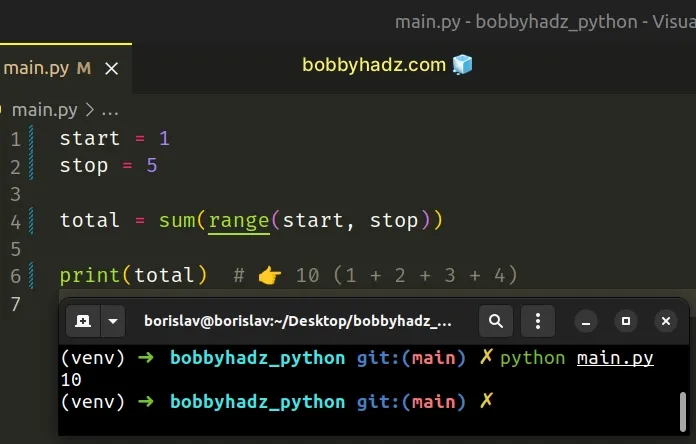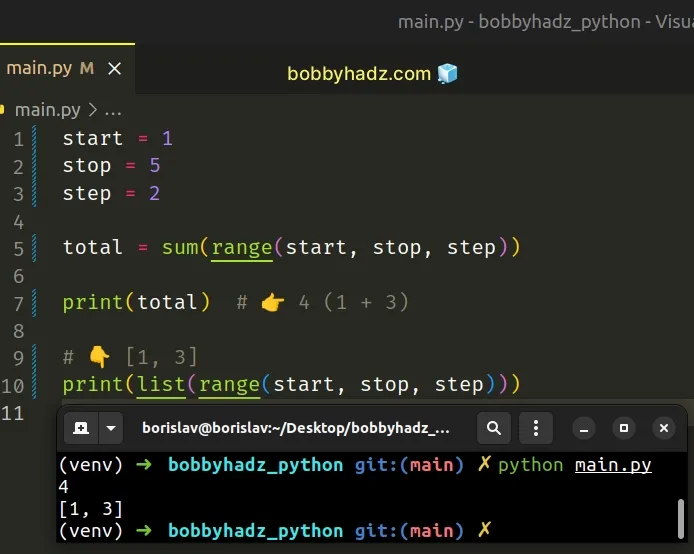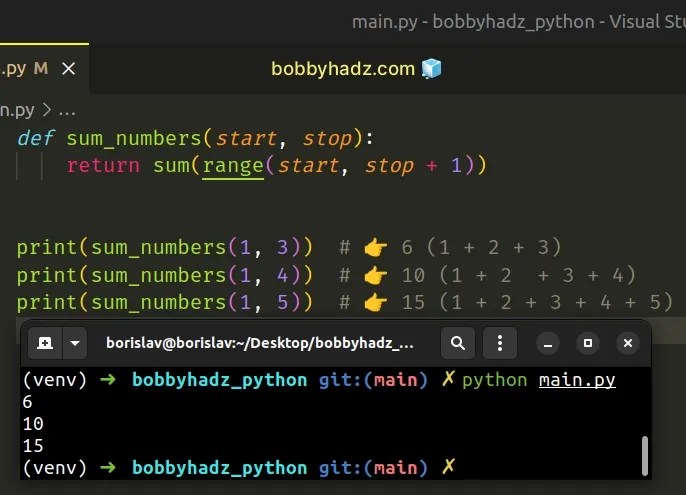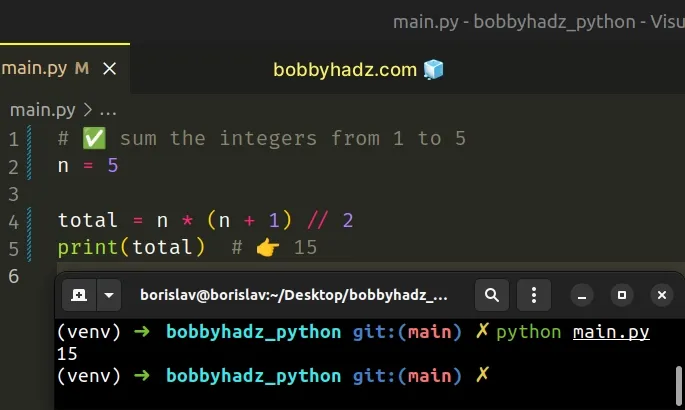How to Sum all Numbers in a Range in Python
Last updated: Apr 9, 2024
Reading time·4 min

# Table of Contents
- Sum all numbers in a range in Python
- Sum the numbers in a range with a step in Python
- Sum the Integers from 1 to N in Python
- Sum the numbers in a range that are divisible by N
# Sum all numbers in a range in Python
To sum all numbers in a range:
- Use the
range()class to get a range of numbers. - Pass the
rangeobject to thesum()function. - The
sum()function will return the sum of the integers in the range.
start = 1 stop = 5 total = sum(range(start, stop)) print(total) # 👉️ 10 (1 + 2 + 3 + 4)

We used the range() class to get a range of numbers.
The range() class is commonly used for looping a specific number of times in for loops and takes the following arguments:
| Name | Description |
|---|---|
start | An integer representing the start of the range (defaults to 0) |
stop | Go up to, but not including the provided integer |
step | Range will consist of every N numbers from start to stop (defaults to 1) |
If you only pass a single argument to the range() constructor, it is
considered to be the value for the stop parameter.
# 👇️ [0, 1, 2, 3, 4] print(list(range(5))) total = sum(range(5)) print(total) # 👉️ 10
start argument is omitted, it defaults to 0 and if the step argument is omitted, it defaults to 1.If values for the start and stop parameters are provided, the start value
is inclusive, whereas the stop value is exclusive.
# 👇️ [1, 2, 3, 4] print(list(range(1, 5))) total = sum(range(1, 5)) print(total) # 👉️ 10
If the value for the stop parameter is lower than the value for the start
parameter, the range will be empty.
# 👇️ [] print(list(range(5, 1))) total = sum(range(5, 1)) print(total) # 👉️ 0
The sum function can be used to calculate the sum of the numbers in the range.
The sum function takes an iterable, sums its items from left to right and returns the total.
The sum function takes the following 2 arguments:
| Name | Description |
|---|---|
| iterable | the iterable whose items to sum |
| start | sums the start value and the items of the iterable. sum defaults to 0 (optional) |
# Sum the numbers in a range with a step in Python
If you need to get a range with a step, pass a value for the third argument of
the range() class.
start = 1 stop = 5 step = 2 total = sum(range(start, stop, step)) print(total) # 👉️ 4 (1 + 3) # 👇️ [1, 3] print(list(range(start, stop, step)))

When the step argument is provided, the range will consist of every N numbers
from start to stop.
The value for the step argument defaults to 1.
# Creating a reusable function
If you have to do this often, define a reusable function.
def sum_numbers(start, stop): return sum(range(start, stop + 1)) print(sum_numbers(1, 3)) # 👉️ 6 (1 + 2 + 3) print(sum_numbers(1, 4)) # 👉️ 10 (1 + 2 + 3 + 4) print(sum_numbers(1, 5)) # 👉️ 15 (1 + 2 + 3 + 4 + 5)

The function takes start and stop values and sums the numbers from start
to stop.
Notice that we added 1 to the stop value to make the range inclusive.
If you want to exclude the last number from the range, remove the addition operator.
def sum_numbers(start, stop): return sum(range(start, stop)) print(sum_numbers(1, 3)) # 👉️ 3 (1 + 2) print(sum_numbers(1, 4)) # 👉️ 6 (1 + 2 + 3) print(sum_numbers(1, 5)) # 👉️ 10 (1 + 2 + 3 + 4)
# Sum the Integers from 1 to N in Python
Multiply by n + 1 and floor-divide by 2 to get the integers from 1 to N.
The result will be the sum of the integers from 1 to N (including N).
# ✅ sum the integers from 1 to 5 n = 5 total = n * (n + 1) // 2 print(total) # 👉️ 15

The example multiplies n by n + 1 and floor-divides by 2 to get the sum of
the integers from 1 to n.
/ of integers yields a float, while floor division // of integers result in an integer.The result of using the floor division
operator is that of a mathematical division with the floor() function applied
to the result.
Here is an example that sums the integers from 1 to 100.
n = 100 total = n * (n + 1) // 2 print(total) # 👉️ 5050
All we had to do was update the value of n to get the sum of the integers from
1 to 100.
If you don't want to use a formula, use the range() class from the previous
subheading.
# Sum the numbers in a range that are divisible by N
If you need to sum the numbers in a range that are divisible by N, use a while
loop.
def sum_divisible_in_range(start, stop, divisor): while start % divisor != 0: start += 1 return sum(range(start, stop, divisor)) print(sum_divisible_in_range(1, 6, 2)) # 👉️ 6 print(sum_divisible_in_range(1, 7, 3)) # 👉️ 9 print(sum_divisible_in_range(1, 8, 4)) # 👉️ 4
We used a while loop to iterate until the start value reaches the divisor.
The last step is to create a range with the start, stop and divisor
values and sum them.
# Additional Resources
You can learn more about the related topics by checking out the following tutorials:
- Sum all values in a Dictionary or List of Dicts in Python
- Sum the elements of a Tuple or List of Tuples in Python
- Subtract a Value from every Number in a List in Python
- How to sum in a For or a While Loop in Python
- How to sum a List of Strings in Python
- Python: Find range overlap and Check if Ranges overlap

